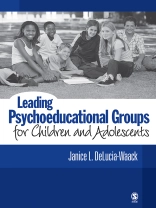This book provides readers with direction on how to organize psychoeducational groups while also helping them enhance skills for effectively leading such groups—all in one comprehensive volume! Offering an applied, pragmatic approach, author Janice L. De Lucia-Waack uniquely integrates research and practice to suggest valuable leadership strategies while addressing special issues such as children of divorce, anger management, bullying behaviors, and much more.
Key Features:
- Uses the model of Planning, Performing, and Processing: Based on the Association for Specialists in Group Work (ASGW) Best Practice Guidelines, this book provides an outline for each step from planning a group to designing sessions to implementing them and also evaluating their effectiveness. The book also includes ASGW Professional Standards for Training of Group Workers and ASGW Principles for Diversity-Competent Group Workers.
- Focuses on the therapeutic relationship and interventions specific to children and teens: Groups for children and adolescents must be designed and implemented differently than groups for adults. What little has been written specifically about psychoeducational groups does not make distinctions based on the age of group members. This is the first book to suggest specific interventions that generate interest and participation on the part of children and adolescents.
- Provides guidance for the entire spectrum of activities related to leading groups: This book offers practical suggestions for how to effectively use activities in group meetings and chronicles common mistakes to avoid. A variety of learning tools such as suggested activities, sample outlines of group sessions, tables with references for related materials, and much more facilitate student comprehension.
Intended Audience: This is an excellent text for advanced undergraduate and graduate students studying Counseling and Therapy of Children and Adolescents, Social Group Work, and Group Counseling for Education in departments of psychology, social work, and education. It is also a valuable resource for social work practitioners, counselors, and psychologists.
विषयसूची
Table of Contents
Ch 1: Introduction
Goals of This Book
How This Book is Organized
What are Psychoeducational Groups and How are They Different From Other Types of Groups?
How are Children and Adolescent Groups Different From Adult Groups?
Summary
Suggested Training Activities
Ch 2: Planning for a Psychoeducational Group for Children and Adolescents
Pre Group Decision Making
Outline and Content of Group Sessions
Agency and School Support
Recruitment Strategies
Leader Preparation
Supervision
Summary
Suggested Training Activities
Ch 3: Pre Group Interviews and Group Sessions
Informed Consent for Parents and Children
Screening Interviews
Preparation Sessions
Summary
Suggested Training Activities
Ch 4: Group Leadership Skills for Psychoeducational Groups
Specific Skills
Therapeutic Factors
Training
Assessment Measures
Summary
Suggested Training Activities
Ch 5: Initial Sessions
Goals and Tasks
Skills
Therapeutic Factors
Possible Pitfalls
Examples of Activities
Summary
Suggested Training Activities
Ch 6: Middle Sessions
Goals and Tasks
Skills
Therapeutic Factors
Possible Pitfalls
Examples of Activities
Summary
Suggested Training Activities
Ch 7: Termination Sessions
Goals and Tasks
Skills
Therapeutic Factors
Possible Pitfalls
Examples of Activities
Summary
Suggested Training Activities
Ch 8: Using Activities Effectively in Group Sessions
Common Mistakes in Using Activities
Uses of Activities Related to Group Tasks
Creative Arts Activities
Effective Processing of Activities
Summary
Suggested Training Activities
Ch 9: Follow-up After Group Ends
Assessment of Progress
Assessment of Need for Further Treatment
Interview Sessions
Referral for Further Treatment
Summary
Suggested Training Activities
Ch 10: Assessment of Group Effectiveness
Guidelines
Assessment of Group Climate
Assessment of Group Therapeutic Factors
Assessment of In-Session Group Behavior
Summary
Suggested Training Activities
Ch 11: Considerations
Multicultural Issues
Developmental Issues
Summary
Suggested Training Activities
Ch 12: Conclusions
APPENDICES
Appendix A: ASGW Professional Standards for Training of Group Workers
Appendix B: ASGW Best Practice Guidelines
Appendix C: ASGW Principles for Diversity-Competent Group Workers
Appendix D: Group Planning Sheets
Appendix E: Group Processing Sheets
Appendix F: Examples of Group Planning and Processing Session Notes for a Psychoeducational Children of Divorce Group
Appendix G: Resource Guide for Group Interventions by Topic Including Books, Games, and Videos
Appendix H: Example of Group Interest Survey Form
Appendix I: Example of an Informational Sheet for Parents About Psychoeducational Groups
Appendix J: Example of a Group Screening Interview Outline
Appendix K: Example of a Group Preparation Session Outline
Appendix L: Example of a Parent and Group Member Consent Form for Psychoeducational Groups
Appendix M: Group Related Measures
References
About the Author
लेखक के बारे में
Janice L. De Lucia-Waack is currently an Associate Professor and Program Director for School Counseling in the Department of Counseling, School, and Educational Psychology at the University at Buffalo, SUNY. She is also currently the Executive Director for the Association for Specialists in Group Work. She is the former editor of the Journal for Specialists in Group Work, and is a fellow in the American Counseling Association; Association for Specialists in Group Work (a division of ACA; and Group Psychology and Group Psychotherapy, a division of the American Psychological Association. She is author/editor of two books, Using Music in Children of Divorce Groups: A Session-By-Session Manual for Counselors and Multicultural Counseling and Training: Implications and Challenges for Practice, and co-editor/author of three other books: The Practice of Multicultural Group Work: Visions and Perspectives from the Field (with Jeremiah Donigian); Group Work Experts Share Their Favorite Activities: A Guide to Choosing, Planning, Conducting, and Processing (with Karen Bridbord and Jennifer Kleiner) , School Counselors Share Their Favorite Activities: A Guide to Choosing, Planning, Conducting, and Processing (with Louisa Foss, Judy Green, Kelli Wolfe-Stiltner), How to Design a Group Plan (with Amy Nitza) as part of Robert Conyne Group Work Practice Kit: Improving the Everyday Practice of Group Work. Her current project is the fifth in the ASGW Group Activity Book Series due out in Fall 2013: School Counselors Share Their Favorite Classroom Guidance Activities. (with Faith Colvin, Sarah Korta, Katherine Maertin, Eric Martin, & Lily Zawadski. She received a bachelor’s degree in Psychology from Eisenhower College, a master’s degree in Family Studies from the University of Maryland, and a Ph.D. in Counseling Psychology from the Pennsylvania State University.












